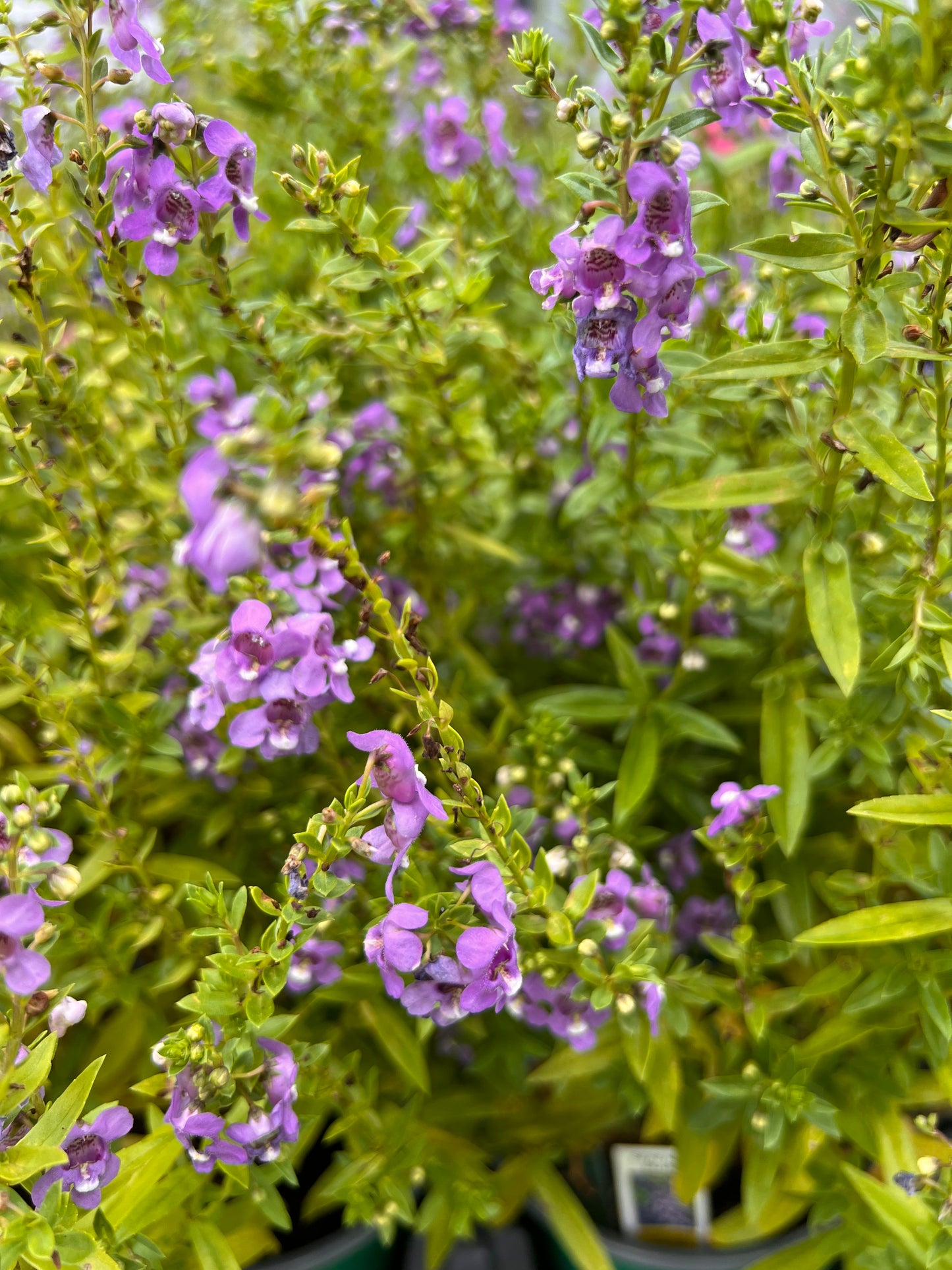Angelonia Serena Blue
Angelonia Serena Blue
Angelonia (Angelonia angustifolia), also known as Summer Snapdragon, is a popular perennial plant in warm climates and an annual in cooler areas. It is known for its spiky, upright growth and colorful, fragrant flowers that resemble small snapdragons. The flowers come in various shades, including white, pink, purple, and blue.
Growing Zones: Angelonia is hardy in USDA zones 9-11. In cooler zones, it is grown as an annual or in containers that can be brought indoors during winter.
Height and Width
Height: Typically grows to a height of 12-24 inches (30-60 cm).
Width: Spreads to a width of 12-18 inches (30-45 cm).
Uses
Ornamental: Widely used in garden beds, borders, and containers for its continuous blooms and attractive foliage. It adds height and color to garden displays.
Cut Flowers: Long-lasting and fragrant flowers make excellent cut flowers for arrangements.
Pollinator Gardens: Attracts bees, butterflies, and other pollinators, making it a valuable addition to wildlife-friendly gardens.
Native Range
Angelonia is native to Mexico and the West Indies.
Planting and Care
1. Site Selection: Choose a location with full sun. Angelonia thrives in hot, sunny spots and tolerates heat and humidity well.
2. Soil: Prefers well-draining soil. Sandy or loamy soils are ideal. It can tolerate poor soil conditions but performs best in fertile soil.
3. Watering: Water regularly but allow the soil to dry out between waterings. Angelonia is drought-tolerant once established but benefits from consistent moisture during its first growing season.
4. Fertilization: Feed with a balanced, slow-release fertilizer at planting time and again mid-season for continuous blooming.
5. Pruning: Deadhead spent flowers to encourage continuous blooming. Pinch back growth early in the season to promote bushier plants.
6. Mulching: Apply a 2-3 inch layer of mulch to retain soil moisture and suppress weeds.
Pests and Diseases
Pests: Generally pest-free but may occasionally suffer from aphids or whiteflies. Treat infestations with insecticidal soap or neem oil.
Diseases: Ensure good air circulation to prevent fungal diseases. Avoid overhead watering to reduce the risk of leaf spot and powdery mildew.
Additional Tips
Heat Tolerance: Angelonia is particularly noted for its heat tolerance, making it a great choice for hot, sunny locations where other plants may struggle.
Container Planting: Ideal for containers, which can be moved indoors in colder climates to extend the growing season.
---SHIPPING NOTICE PLEASE READ BEFORE PURCHASING LIVE PLANTS!---
We WILL NOT refund the purchase of or the shipping cost of live plants purchased with the intent to be shipped to states that do not authorize importing live plants or to states with restrictions! Purchases to these states will be held for 30 days for pick-up at our Slidell, Louisiana store and the shipping cost associated with these purchases will be held for the care of the plant while waiting to be picked up. All sales are final. If the plant(s) purchased are not picked up within 30 days from the date of order, these items will be returned to our sales inventory and you WILL NOT be refunded. Thank you for understanding these policies.
Due to regulations, certain states have restrictions on importing plants. Please review the list below to ensure you're not attempting to order any restricted plants in your area.
**Important Note:** We do not ship any plants outside the U.S.
State-Specific Restrictions - We ARE NOT responsible for any plant(s) that are not listed in these restrictions. Purchaser bears all responsibility for making sure the plant(s) they desire to purchase are not banned from being imported to the shipping state:
Arizona: Juglans spp.
California: Castanea spp., Juglans spp., Pinus spp., Quercus spp.
Colorado: Some counties restrict Prunus spp. Please verify your local county regulations.
Florida: Castanea spp., Cornus spp., Quercus spp., Cornus mas
Georgia: Vaccinium spp.
Hawaii: Pinus spp.
Idaho: Humulus lupulus, Mentha spp., Vitis spp.
Indiana: Fragraria spp., Rosa spp.
Kansas: Juglans spp.
Michigan: Abies spp., Vaccinium spp.
Montana: Pinus spp.
Nevada: Allium spp.
Mentha spp.
New Jersey: Rosa spp.
New York: Vitis spp.
Oregon: Allium spp., Castanea spp., Corylus spp., Humulus lupulus, Quercus spp., Sambucus nigra, Ulmus spp., Vaccinium spp., Vitis spp.
Texas: Juglans spp.
Washington: Allium spp., Castanea spp., Corylus spp., Humulus lupulus, Vaccinium spp., Vitis spp.
Wisconsin: Abies spp., Pinus spp., Picea spp., Mentha spp.
Additionally, we cannot ship plants in soil medium to the following states: AK, AL, AR, AZ, CA, HI, ID, KS, MS, MT, ND, NM, NV, OK, OR, SD, TX, UT, WA.
Couldn't load pickup availability


